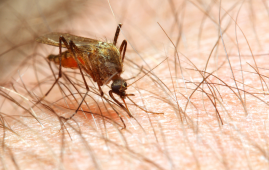

A landmark global health study led by researchers from the University of Maryland School of Medicine (UMSOM) has demonstrated that a new five-strain meningitis vaccine (Men5CV) is safe and effective for infants as young as 9 months, offering promising new hope in the fight to eliminate meningitis epidemics in Africa. The findings, published in The Lancet, have led the World Health Organization (WHO) to recommend Men5CV for routine immunization across the African meningitis belt.
Why Men5CV Is a Game-Changer for Africa
The African meningitis belt, spanning 26 countries from Senegal to Ethiopia, suffers from one of the highest rates of meningitis worldwide, primarily caused by Neisseria meningitidis. Traditional vaccines addressed only a limited number of strains, but Men5CV covers five key serogroups (A, C, W, X, Y)—offering broad protection.
The region sees fatality rates exceeding 15%, and survivors often face severe long-term complications like brain damage and paralysis. Because of limited healthcare access and rapid disease progression, vaccination is the most effective prevention strategy.
Study Overview and Key Findings
Conducted in Mali, the Phase 3 clinical trial enrolled over 1,300 children, randomized to receive Men5CV either at 9 months or 15 months of age, alongside routine childhood vaccines. Infants in the 9-month group received Men5CV or a comparator vaccine (MenACWY-TT), which covers fewer strains.
Key Results:
- Men5CV was safe and immunogenic in infants starting at 9 months.
- The vaccine induced strong immune responses against all five serogroups.
- Can be co-administered with other childhood vaccines, making rollout easier.
- Stable at room temperature for up to 12 weeks, making it ideal for low-resource settings.
- Affordable for African countries, enhancing accessibility.
WHO Recommendation and Global Impact
Following these findings, WHO recommended Men5CV for use starting at 9 months, facilitating integration into routine immunization schedules. This eliminates the need for separate visits and could prevent thousands of deaths and end epidemics caused by previously unaddressed serogroups.
Dr. Wilbur Chen, lead protocol chair, emphasized:
“This critical clinical study provides reassuring evidence that Men5CV can be safely and effectively given along with other routine immunizations, potentially saving tens of thousands of lives.”
Future of Meningitis Prevention
PATH, a key collaborator, praised the study as essential for expanding protection across Africa. Following the success of MenAfriVac, which virtually eliminated meningococcal A disease, Men5CV has the potential to end remaining epidemics caused by other strains, moving closer to WHO’s 2030 goal of defeating meningitis.
Dr. Karen Kotloff, co-author, added:
“Demonstrating that this vaccine is safe and immunogenic in infants is a critical step in preventing epidemics of severe illness and death in Africa’s meningitis belt.”
Conclusion
This groundbreaking study signals a major leap forward in global meningitis prevention, offering a powerful new tool to eliminate deadly outbreaks in vulnerable regions. Integration of Men5CV into routine immunization programs marks a pivotal moment in global health, protecting millions of children and moving closer to a meningitis-free future.
More Information: Diallo, F., et al. (2025) Safety and immunogenicity of a pentavalent meningococcal conjugate vaccine targeting serogroups A, C, W, Y, and X when co-administered with routine childhood vaccines at ages 9 months and 15 months in Mali: a single-centre, double-blind, randomised, controlled, phase 3, non-inferiority trial. The Lancet. doi.org/10.1016/S0140-6736(25)00046-7.
more recommended stories
 Red Meat Consumption Linked to Higher Diabetes Odds
Red Meat Consumption Linked to Higher Diabetes OddsKey Takeaways Higher intake of total,.
 Rising Measles Cases Prompt Vaccination Push in NC
Rising Measles Cases Prompt Vaccination Push in NCKey Highlights 15 confirmed Measles cases.
 Rising Chagas Parasite Detected in Borderland Kissing Bugs
Rising Chagas Parasite Detected in Borderland Kissing BugsKey Takeaways (At a Glance) Infection.
 Phage Therapy Study Reveals RNA-Based Infection Control
Phage Therapy Study Reveals RNA-Based Infection ControlKey Takeaways (Quick Summary) Researchers uncovered.
 Urine-Based microRNA Aging Clock Predicts Biological Age
Urine-Based microRNA Aging Clock Predicts Biological AgeKey Takeaways (Quick Summary) Researchers developed.
 Ultramarathon Physiology: What HCPs Should Know?
Ultramarathon Physiology: What HCPs Should Know?Ultramarathon Metabolism: What Happens to the.
 Sterilized Fermented Beverage for Obesity: New Evidence
Sterilized Fermented Beverage for Obesity: New EvidenceEarly Insights Into a Sterilized Fermented.
 Safer Allogeneic Stem Cell Transplants with Treg Therapy
Safer Allogeneic Stem Cell Transplants with Treg TherapyA new preclinical study from the.
 New Malaria Prevention Insights From African Biostatistics
New Malaria Prevention Insights From African BiostatisticsHow New Data Is Reframing Malaria.
 AI in Emergency Medicine and Clinician Decision Accuracy
AI in Emergency Medicine and Clinician Decision AccuracyEmergency teams rely on rapid, accurate.

Leave a Comment